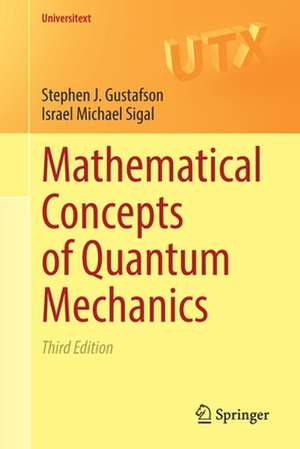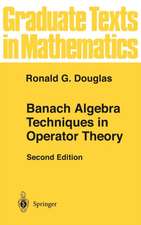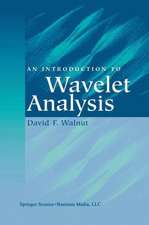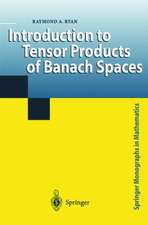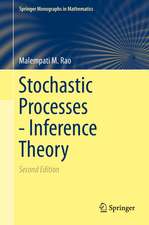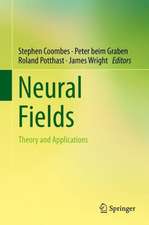Mathematical Concepts of Quantum Mechanics: Universitext
Autor Stephen J. Gustafson, Israel Michael Sigalen Limba Engleză Paperback – 22 oct 2020
Starting with an overview of key physical experiments illustrating the origin of the physical foundations, the book proceeds with a description of the basic notions of quantum mechanics and their mathematical content.
It then makes its way to topics of current interest, specifically those in which mathematics plays an important role. The more advanced topics presented include: many-body systems, modern perturbation theory, path integrals, the theory of resonances, adiabatic theory, geometrical phases, Aharonov-Bohm effect, density functional theory, open systems, the theory of radiation (non-relativistic quantum electrodynamics), and the renormalization group.
With different selections of chapters, the book can serve as a text for an introductory, intermediate, or advanced course in quantum mechanics. Some of the sections could be used for introductions to geometrical methods in Quantum Mechanics, to quantum information theory and to quantum electrodynamics and quantum field theory.
| Toate formatele și edițiile | Preț | Express |
|---|---|---|
| Paperback (2) | 435.63 lei 38-44 zile | |
| Springer Berlin, Heidelberg – 14 sep 2011 | 435.63 lei 38-44 zile | |
| Springer International Publishing – 22 oct 2020 | 497.75 lei 6-8 săpt. |
Din seria Universitext
- 13%
 Preț: 353.49 lei
Preț: 353.49 lei -
 Preț: 487.96 lei
Preț: 487.96 lei - 15%
 Preț: 543.75 lei
Preț: 543.75 lei -
 Preț: 418.67 lei
Preț: 418.67 lei - 20%
 Preț: 628.22 lei
Preț: 628.22 lei -
 Preț: 322.62 lei
Preț: 322.62 lei - 17%
 Preț: 364.82 lei
Preț: 364.82 lei -
 Preț: 634.38 lei
Preț: 634.38 lei - 17%
 Preț: 427.32 lei
Preț: 427.32 lei - 13%
 Preț: 355.52 lei
Preț: 355.52 lei - 17%
 Preț: 431.50 lei
Preț: 431.50 lei - 19%
 Preț: 429.21 lei
Preț: 429.21 lei - 19%
 Preț: 393.95 lei
Preț: 393.95 lei -
 Preț: 360.08 lei
Preț: 360.08 lei -
 Preț: 358.44 lei
Preț: 358.44 lei - 13%
 Preț: 389.95 lei
Preț: 389.95 lei -
 Preț: 465.61 lei
Preț: 465.61 lei -
 Preț: 371.99 lei
Preț: 371.99 lei - 15%
 Preț: 497.22 lei
Preț: 497.22 lei - 15%
 Preț: 737.46 lei
Preț: 737.46 lei - 17%
 Preț: 394.41 lei
Preț: 394.41 lei - 15%
 Preț: 509.58 lei
Preț: 509.58 lei - 17%
 Preț: 427.68 lei
Preț: 427.68 lei - 8%
 Preț: 495.44 lei
Preț: 495.44 lei - 17%
 Preț: 364.57 lei
Preț: 364.57 lei - 17%
 Preț: 369.08 lei
Preț: 369.08 lei -
 Preț: 396.55 lei
Preț: 396.55 lei - 15%
 Preț: 553.33 lei
Preț: 553.33 lei - 17%
 Preț: 365.35 lei
Preț: 365.35 lei -
 Preț: 356.78 lei
Preț: 356.78 lei -
 Preț: 673.45 lei
Preț: 673.45 lei - 17%
 Preț: 426.76 lei
Preț: 426.76 lei - 20%
 Preț: 569.56 lei
Preț: 569.56 lei -
 Preț: 372.87 lei
Preț: 372.87 lei -
 Preț: 319.07 lei
Preț: 319.07 lei -
 Preț: 379.86 lei
Preț: 379.86 lei -
 Preț: 445.88 lei
Preț: 445.88 lei -
 Preț: 382.36 lei
Preț: 382.36 lei - 15%
 Preț: 533.72 lei
Preț: 533.72 lei - 15%
 Preț: 496.02 lei
Preț: 496.02 lei - 15%
 Preț: 474.82 lei
Preț: 474.82 lei -
 Preț: 389.70 lei
Preț: 389.70 lei -
 Preț: 484.08 lei
Preț: 484.08 lei - 15%
 Preț: 643.48 lei
Preț: 643.48 lei -
 Preț: 415.02 lei
Preț: 415.02 lei - 15%
 Preț: 602.25 lei
Preț: 602.25 lei - 20%
 Preț: 510.24 lei
Preț: 510.24 lei - 15%
 Preț: 588.37 lei
Preț: 588.37 lei -
 Preț: 381.59 lei
Preț: 381.59 lei
Preț: 497.75 lei
Nou
Puncte Express: 747
Preț estimativ în valută:
95.26€ • 103.43$ • 80.01£
95.26€ • 103.43$ • 80.01£
Carte tipărită la comandă
Livrare economică 23 aprilie-07 mai
Preluare comenzi: 021 569.72.76
Specificații
ISBN-13: 9783030595616
ISBN-10: 3030595617
Pagini: 456
Ilustrații: XIV, 456 p. 33 illus.
Dimensiuni: 155 x 235 x 28 mm
Greutate: 0.65 kg
Ediția:3rd ed. 2020
Editura: Springer International Publishing
Colecția Springer
Seria Universitext
Locul publicării:Cham, Switzerland
ISBN-10: 3030595617
Pagini: 456
Ilustrații: XIV, 456 p. 33 illus.
Dimensiuni: 155 x 235 x 28 mm
Greutate: 0.65 kg
Ediția:3rd ed. 2020
Editura: Springer International Publishing
Colecția Springer
Seria Universitext
Locul publicării:Cham, Switzerland
Cuprins
1 Physical Background.- 2 Dynamics.- 3 Observables.- 4 Quantization.- 5 Uncertainty Principle and Stability of Atoms and Molecules.- 6 Spectrum and Dynamics.- 7 Special Cases.- 8 Bound States and Variational Principle.- 9 Scattering States.- Existence of Atoms and Molecules.- 11 Perturbation Theory: Feshbach-Schur Method.- 12 Born-Oppenheimer Approximation and Adiabatic Dynamics.- 13 General Theory of Many-particle Systems.- 14 Self-consistent Approximations.- 15 The Feynman Path Integral.- 16 Semi-classical Analysis.- 17 Resonances.- 18 Quantum Statistics.- 19 Open Quantum Systems.- 20 The Second Quantization.- 21 Quantum Electro-Magnetic Field – Photons.- 22 Standard Model of Non-relativistic Matter and Radiation.- 23 Theory of Radiation.- 24 Renormalization Group.- 25 Mathematical Supplement: Spectral Analysis.- 26 Mathematical Supplement: The Calculus of Variations.- 27 Comments on Literature, and Further Reading.- References.- Index.
Notă biografică
Stephen J. Gustafson is Professor of Mathematics at the University of British Columbia. His research centres on various partial differential equations arising in physics.
Israel Michael Sigal is the Norman Stuart Robertson chair in Applied Mathematics at the University of Toronto. He works in several areas of mathematical physics and applied mathematics.
Textul de pe ultima copertă
The book gives a streamlined introduction to quantum mechanics while describing the basic mathematical structures underpinning this discipline.
Starting with an overview of key physical experiments illustrating the origin of the physical foundations, the book proceeds with a description of the basic notions of quantum mechanics and their mathematical content.
It then makes its way to topics of current interest, specifically those in which mathematics plays an important role. The more advanced topics presented include: many-body systems, modern perturbation theory, path integrals, the theory of resonances, adiabatic theory, geometrical phases, Aharonov-Bohm effect, density functional theory, open systems, the theory of radiation (non-relativistic quantum electrodynamics), and the renormalization group.
With different selections of chapters, the book can serve as a text for an introductory, intermediate, or advanced course in quantum mechanics. Some of the sections could be used for introductions to geometrical methods in Quantum Mechanics, to quantum information theory and to quantum electrodynamics and quantum field theory.
Starting with an overview of key physical experiments illustrating the origin of the physical foundations, the book proceeds with a description of the basic notions of quantum mechanics and their mathematical content.
It then makes its way to topics of current interest, specifically those in which mathematics plays an important role. The more advanced topics presented include: many-body systems, modern perturbation theory, path integrals, the theory of resonances, adiabatic theory, geometrical phases, Aharonov-Bohm effect, density functional theory, open systems, the theory of radiation (non-relativistic quantum electrodynamics), and the renormalization group.
With different selections of chapters, the book can serve as a text for an introductory, intermediate, or advanced course in quantum mechanics. Some of the sections could be used for introductions to geometrical methods in Quantum Mechanics, to quantum information theory and to quantum electrodynamics and quantum field theory.
Caracteristici
A very readable introduction to modern mathematical topics in quantum mechanics Solves the problem of how to teach quantum mechanics to mathematically oriented students in an optimal way Shows how the mathematical treatment of quantum mechanics brings insights to physics Useful guide to the literature
Recenzii
From
the
reviews
of
the
second
edition:
“This is the second edition of a readable introduction to modern mathematical topics in quantum mechanics intended for students of mathematics or physics. In comparison to the first edition the authors have tried to make the book more self-contained by adding further proofs and background material. … The overall style has not changed and with the extra background material it is now even better suited as the basis of a graduate course.” (G. Teschl, Monatshefte für Mathematik, Vol. 166 (2), May, 2012)
“This is the second edition of a readable introduction to modern mathematical topics in quantum mechanics intended for students of mathematics or physics. In comparison to the first edition the authors have tried to make the book more self-contained by adding further proofs and background material. … The overall style has not changed and with the extra background material it is now even better suited as the basis of a graduate course.” (G. Teschl, Monatshefte für Mathematik, Vol. 166 (2), May, 2012)
